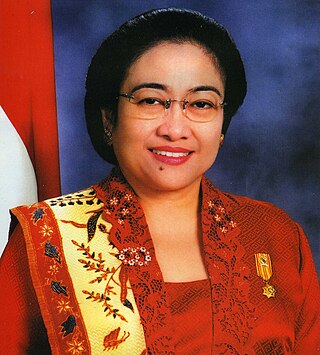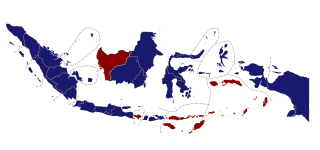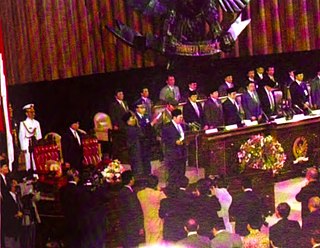
Jemaah Islamiyah is a Southeast Asian Islamist militant group based in Indonesia, which is dedicated to the establishment of an Islamic state in Southeast Asia. On 25 October 2002, immediately following the JI-perpetrated 2002 Bali bombings, JI was added to the UN Security Council Resolution 1267.

Diah Permata Megawati Setiawati Sukarnoputri is an Indonesian politician who served as the fifth president of Indonesia from 2001 to 2004. She previously served as the eighth vice president from 1999 to 2001.

Abdurrahman Wahid, though more colloquially known as Gus Dur, was an Indonesian politician and Islamic religious leader who served as the 4th president of Indonesia, from his election in 1999 until he was removed from office in 2001. A long time leader within the Nahdlatul Ulama organization, he was the founder of the National Awakening Party (PKB). He was the son of Minister of Religious Affairs Wahid Hasyim, and the grandson of Nahdatul Ulama founder Hasyim Asy'ari. He had a visual impairment caused by glaucoma, he was blind in the left eye and partially blind in his right eye. He was the first and to date the only president of Indonesia to have had physical disabilities.

The Indonesian Democratic Party of Struggle is a secular-nationalist political party in Indonesia. Since 2014, it has been the ruling and largest party in the House of Representatives (DPR) with 128 seats. The party is currently led by Megawati Sukarnoputri, who served as the President of Indonesia from 2001 to 2004. It is also the party of the current president, Joko Widodo.

The United Development Party is an Islamist political party in Indonesia. Due to its distinctive logo, the party is known as the "Kaaba Party".

Abu Bakar Ba'asyir also known as Abu Bakar Bashir, Abdus Somad, and Ustad Abu is an Indonesian Muslim cleric and leader of Jamaah Ansharut Tauhid.

Legislative elections were held in on 5 April 2004 for both houses of the People's Consultative Assembly of Indonesia. This included all 550 seats in the People's Representative Council and 128 seats of the newly-formed Regional Representative Council.

Presidential elections were held in Indonesia on 5 July and 20 September 2004. As no candidate won a majority in the first round, a runoff was held, in which Susilo Bambang Yudhoyono defeated Megawati Sukarnoputri and was elected president. They were the first direct presidential elections in the history of Indonesia; prior to a 2002 amendment to the Constitution of Indonesia, both the president and vice president had been elected by the People's Consultative Assembly (MPR).

Nahdlatul Ulama is an Islamic organization in Indonesia. Its membership numbered over 95 million in 2021, making it the largest Islamic organization in the world. NU is also a charitable body funding schools and hospitals as well as organizing communities to help alleviate poverty.

A one-tonne car bomb, which was packed into a small Daihatsu delivery van, exploded outside the Australian embassy at Kuningan District, South Jakarta, at about 10:30 local time on 9 September 2004, killing 9 people including the suicide bomber, and wounding over 150 others. The explosion gutted the Greek embassy on the 12th floor of an adjacent building, where three diplomats were slightly wounded. Damage to the nearby Chinese embassy was also reported. Numerous office buildings surrounding the embassy were also damaged by the blast, which shattered windows in buildings 500 metres (500 yd) away, injuring many workers inside, mostly by broken glass.

The Reform Star Party was a political party in Indonesia. The party was merged into the Great Indonesia Movement Party in 2011.

A series of bombings occurred on 1 October 2005 in Bali, Indonesia. Bombs exploded at two sites in Jimbaran Beach resort and in Kuta 30 km (19 mi) away, both in south Bali. The terrorist attack claimed the lives of 20 people and injured more than 100 others. The three bombers also died in the attacks. The attack was known in Indonesia as the second Bali bombing or Bali bombing II to distinguish it from the previous attack in 2002.

The Post-Suharto era is the contemporary history in Indonesia, which began with the resignation of authoritarian president Suharto on 21 May 1998. Since his resignation, the country has been in a period of transition known as the Reform era. This period has been characterised by a more open political-social environment and grassroots economic improvement.
On the 2000 Christmas Eve, a series of explosions took place in Indonesia, which were part of a high-scale terrorist attack by Al Qaeda and Jemaah Islamiyah. The attack involved a series of coordinated bombings of churches in Jakarta and eight other cities which killed 18 people and injured many others.
Mujahedeen KOMPAK or KOMPAC is a Darul Islam organisation based in Indonesia's Sulawesi province. Formed in 1988 with the stated aim of helping victims of conflict and disaster, it has been linked to providing funding for terrorist organisations such as Jemaah Islamiyah as well as carrying out attacks on local Christian groups. The organisation has been accused of diverting relief funds from mainstream Muslims in Australia and abroad to fund terrorist activities.

Huda bin Abdul Haq was an Indonesian terrorist who was convicted and executed for his role in coordinating the Christmas Eve 2000 Indonesia bombings and 2002 Bali bombings. Mukhlas was a senior and influential Jemaah Islamiyah leader with ties to Osama bin Laden.
My Friend the Fanatic is a travel narrative by the Indian-American author Sadanand Dhume about his exploration of Islamic extremism in Indonesia, the world's most populous Muslim country. Dhume's travel companion is a young Javanese, an Osama bin Laden admirer who edits the country's foremost fundamentalist magazine.
From 20 to 21 October 1999, the People's Consultative Assembly (MPR), the legislative branch of Indonesia, met to elect both the president and vice president of the country for a five-year term. The incumbent president, B. J. Habibie, declined to stand for election. On 20 October, Abdurrahman Wahid, chairman of the Nahdlatul Ulama, was elected president and inaugurated on the same day. Wahid's opponent, Megawati Sukarnoputri was subsequently elected vice president the next day. The elections represented the first relatively democratic and peaceful transfer of power in the history of Indonesia.

The inauguration of Abdurrahman Wahid as the fourth president of Indonesia took place on Wednesday, 20 October 1999 at the DPR/MPR Building, Jakarta. The ceremony marked the commencement of Wahid's only term as president.

Abdurrahman Wahid, also known as Gus Dur, was impeached and dismissed as the fourth president of Indonesia on 23 July 2001, after he issued a decree to dissolve the Indonesian legislature and suspend the Golkar party.

















